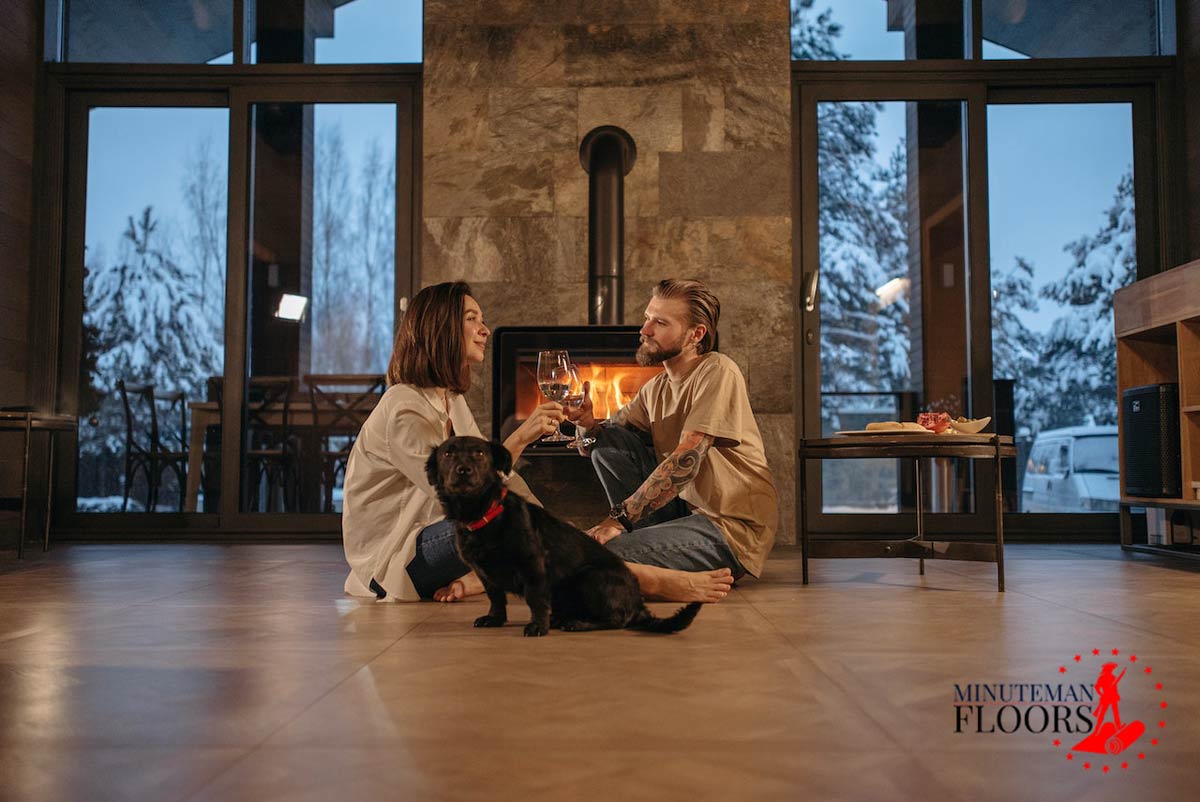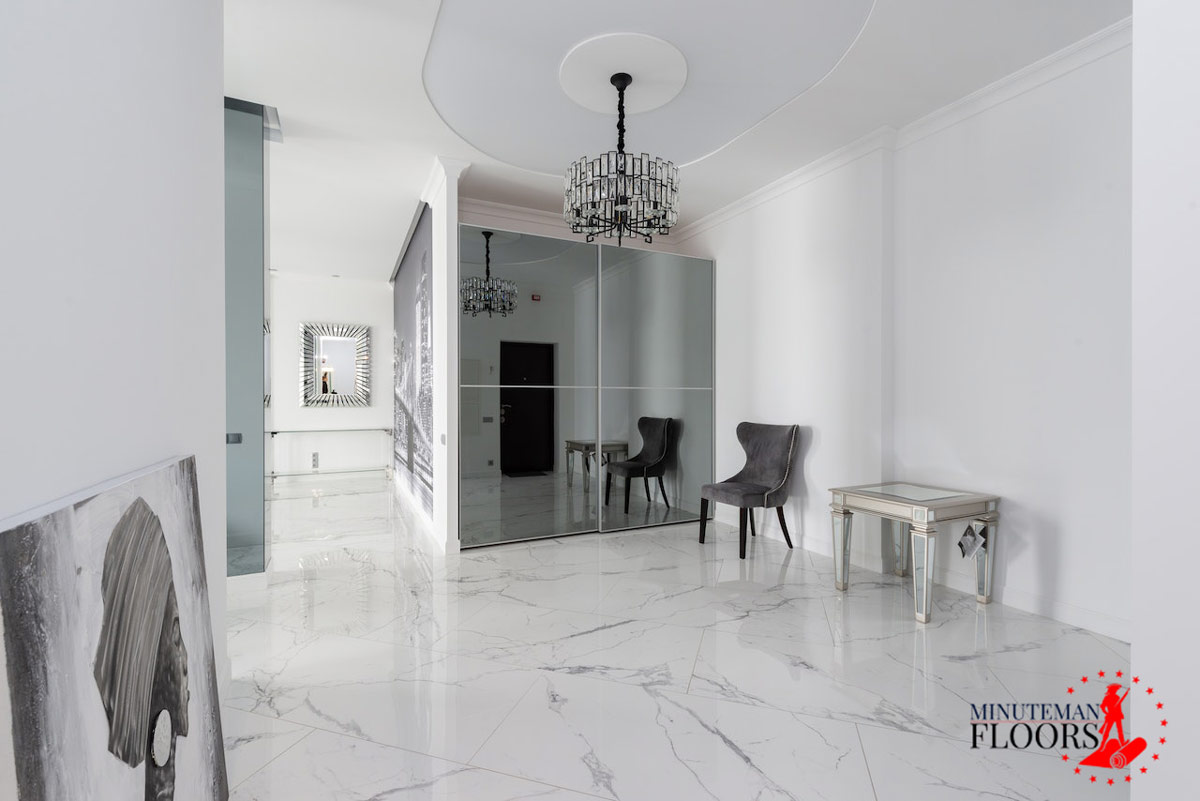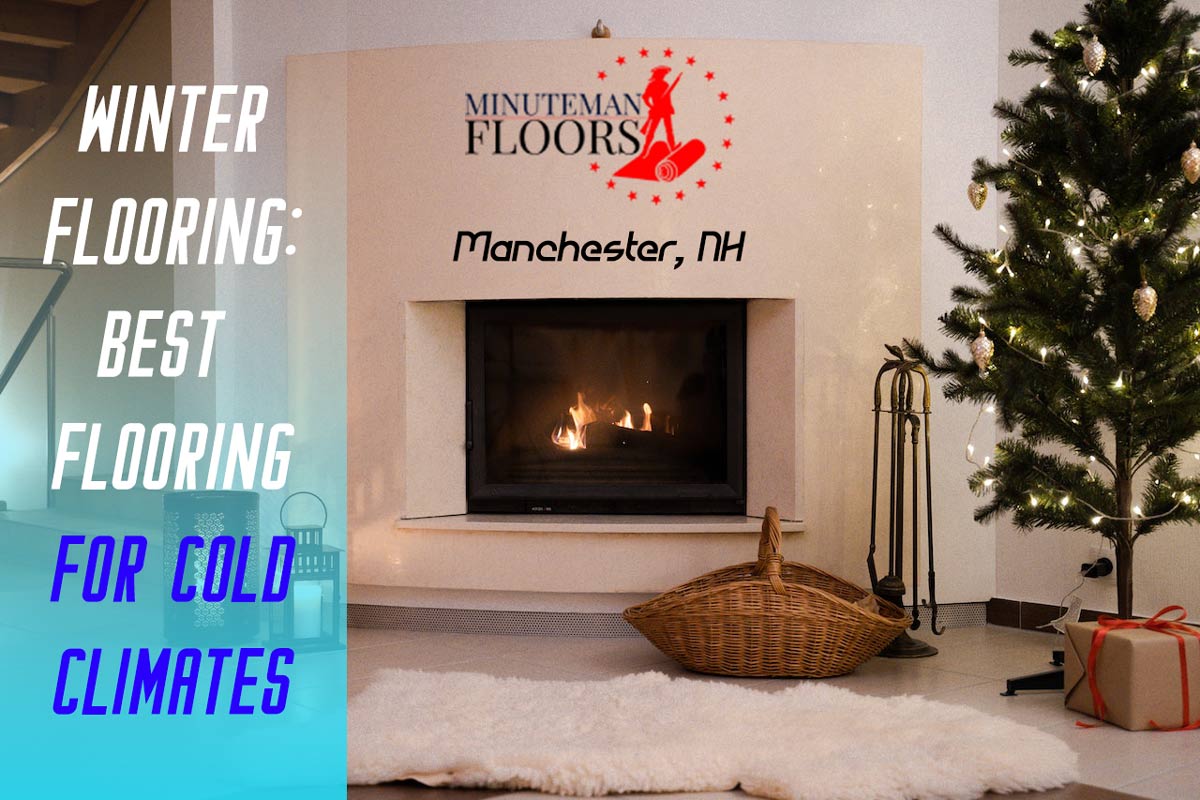You might think that the climate only affects outdoor flooring, but you are WRONG! Whether at home or office, the interaction between flooring and climate is an important factor to consider when choosing the flooring material, installing it, and even its maintenance.
Every climate affects flooring materials differently. Choosing a type of flooring that is not compatible with the climate of the region will cause damage and compromise its functionality and durability.
Except for the material, the period of acclimation and installation techniques are directly related to the climate, humidity, and temperature of the place.
So, to help you make the right decision for your floor and its proper maintenance, we will discuss the best flooring for different kinds of climates.
At the end, we will also recommend the most compatible flooring materials with the climate in Manchester, New Hampshire.
Looking for a trusted flooring company in Manchester, NH?
We offer a combination of experience, science, and quality to bring the best flooring to your home and office in Manchester, Hooksett, Bedford, Candia, and Goffstown.
Call to discuss your project with our flooring experts.
How Climate Affects Flooring?
Flooring and climate interact with each other in different ways. Climate, or more specifically the level of humidity and the temperature, causes some reactions in different flooring materials that are not desirable for us.
So, we need to be aware of such effects to prevent potential damage to the flooring’s appearance and structure.
Here are the main considerations:
Flooring Expansion and Contraction
Humidity and temperature changes can lead to expansion or contraction in materials.
When the humidity is high, the flooring material absorbs the moisture in the air and expands. On the contrary, when it is dry, the flooring loses its moisture and shrinks.
The same is true for temperature. So, higher temperature causes expansion in the flooring materials while lower temperature causes contraction. This can be particularly problematic in climates where the difference in temperatures in hot and cold seasons (or day and night) is a lot.
Such fluctuations will lead to
- cupping,
- warping,
- cracking,
- buckling,
- uneven surface,
- becoming loose,
- and creating gaps between the planks/tiles.
These problems are more noticeable in some flooring materials than others, such as hardwood flooring, laminate flooring, and tile flooring. But engineered hardwood floors and vinyl flooring are more resistant choices when it comes to humidity and temperature fluctuations.
Overall, the floor humidity and temperature have to remain relatively consistent if you want to avoid frequent repairs and replacements.
Moisture Damage
In coastal regions and highly humid climates, the moisture builds up in the air and it can lead to problems more than flooring expansion. When the moisture is too much, if the floor is not water resistant, you are in for some serious moisture damage.
This means you can see not only warping but also the growth of mold and mildew, which can ruin the whole structure of the flooring if not addressed properly and immediately.
So, for such environmental conditions, instead of hardwood, it’s better to go with water-resistant flooring materials like
- ceramic tiles,
- porcelain tiles,
- luxury vinyl tiles/planks,
- and concrete.
Insulation and Comfort
When it comes to flooring, insulation can refer to both thermal and sound insulation. As we are only focusing on the connection between flooring and climate for now, let’s discuss how thermal insulation can play a role in the functionality of the flooring.
A material with lower thermal conductivity (or high thermal resistance) helps in regulating the temperature of your home or office, particularly in colder climates. In other words, it can keep the heat inside the space in cold weather, keeping it warm. And, during summer, it keeps the space cool.
For example, cork and carpet flooring are well-known for their thermal insulation properties. On the other hand, tiles or natural stone flooring can easily transmit the heat.
So, for those who are living in a cold climate, if there are no underfloor heating systems, they should opt for carpets or cork flooring. Otherwise, they have to consume a lot of energy to keep the place warm. Plus, the freezing cold floor can be a pain in the neck for their feet. But for hot areas, this cool floor can be a blessing.
Acclimation of Flooring Materials
Simply put, acclimation is the process of leaving the flooring materials in the installation site for a period of time before installation to let it adapt to the new environmental conditions of the place. For example, to adjust to the temperature and the levels of moisture and humidity.
So, the material has time to expand or contract before being installed. This is a necessary step to avoid damage after installation, like gaps between planks, buckling, warping, loose tiles/planks, mold and mildew, etc.
The average time for acclimation is 48 to 72 hours but it can change based on the material (its composition, thickness, size, etc.) and the conditions of the place. Therefore, the exact time is usually determined according to the manufacturer’s guidelines and your flooring contractor’s experience with the local climate and flooring types.
Therefore, it is essential to hire flooring professionals for flooring installation. They usually measure the levels of temperature, humidity, and moisture of the site accurately before making any decisions.
Installation Techniques
Except for acclimating the flooring materials properly before installation, every climate may require the installers to adopt certain techniques to prevent problems and damage soon after installation.
Some of these flooring installation considerations based on the climate include
- choosing the right adhesives that can provide proper bonding,
- subfloor preparation,
- using humidifiers during installation in dry climates,
- and accommodating enough space for potential expansion.
Experience, expertise, and manufacturer’s guidelines can help flooring professionals decide on the right installation techniques.

Floor Maintenance and Climate
Another significant topic to discuss when it comes to flooring and climate is how climate affects flooring maintenance and cleaning.
Here are the main flooring maintenance tips:
- Check the levels of humidity regularly and keep it balanced by using humidifiers, dehumidifiers, and air conditioners.
- Regular inspection for any damage caused by extreme temperatures and temperature fluctuations.
- Keeping the floor clean and dry to avoid mold, mildew, and water damage.
- Filling the gaps and repairing or replacing the damaged tiles/planks.
- Inspect the subfloor, especially after heavy rainfalls, for any water damage that can affect the floor.
- Proper and timely sealing and refinishing.
To sum up, the climate affects your flooring in different ways, so it is an important factor when it comes to choosing the right flooring type. And, if you are worried about your current flooring and climate impact, the key is to be aware of the potential effects and problems the region’s climate can cause for your specific floor.
Not sure what is the best flooring for you? Call and let our experienced flooring experts help you make the right decision.
Call for more information.
Flooring and Climate: What’s the Best Flooring Options for Your Climate?
As we get a lot of questions about flooring and climate, here we try to discuss some of your main concerns about the matter.
What Are the Best Flooring Options in a Hot Climate?
The most suitable flooring materials for a hot climate should be resistant to high temperatures (so that it wouldn’t expand too much or go out of shape) and moisture (in humid areas). If it feels cool underfoot will be a plus. The best choices include
- Ceramic or porcelain tiles,
- Concrete,
- Natural stone,
- Luxury vinyl flooring (LVF),
- And engineered bamboo flooring.
Engineered hardwood, cork, terrazzo, and some kind of laminate can also be good options.
What Flooring Materials Are Not Suitable for Hot and Humid Climates?
- Hardwood (because hardwood floor and humidity do not get along!)
- Carpet (because it traps the moisture of the air and becomes an ideal place for mold and mildew.)
- Laminate with HDF core (Because HDF can easily get damaged by humidity and moisture).
What Can I Do to Make My Hardwood Floor More Resistant to Hot and Humid Climates?
While solid hardwood is not a go-to option for such environmental conditions, there are things you can do to make it more suited to high levels of humidity and temperatures.
- Moisture-resistant finishes, like polyurethane or epoxy,
- Installing a moisture barrier between the subfloor and the hardwood floor,
- Proper acclimation before installation,
- Controlling the indoor humidity level,
- Regular inspections and maintenance.
What Is the Best Humidity for Hardwood Floors?
Whether in dry or humid climates, hardwood floor humidity levels should remain consistent to avoid damage caused by too dry or too humid floors. The best humidity level for hardwood flooring is normally between 35% to 55%. You should monitor the floor humidity and keep it in the normal range with humidifiers or dehumidifiers.
Learn How to Avoid Hardwood Flooring Damage here.

What Is a Suitable Vinyl Plank Flooring Temperature?
Extreme temperatures may compromise the structural integrity of the vinyl floor and shorten its lifespan. The ideal temperature range for (luxury) vinyl flooring is 65°F to 85°F (between 18°C and 29°C). Try to control the LVT flooring temperature and make sure it does not get too much higher or lower than this range.
What Is the Best Flooring for Humid Basement?
If you don’t want to worry about your basement water damage every day, go with
- Ceramic/porcelain tiles,
- Concrete,
- Or luxury vinyl.
What Flooring Materials Are Recommended for Cold Climates?
Good flooring in cold regions means it can provide insulation and warmth. It should also feel comfortable underfoot, not icy. So, try the options below.
- Carpeting (the ultimate choice for cold climates),
- Hardwood,
- Cork,
- Laminate,
- Luxury vinyl flooring,
However, if you are using underfloor heating systems, you don’t have to worry about tile or natural stone flooring.
What Are Some Flooring Maintenance Considerations in Cold Seasons?
To prevent damaging your flooring in cold weather, consider
- using doormats at the entryway to avoid bringing in dirt and moisture,
- keep it clean but do not use a lot of moisture or harsh chemicals,
- control the indoor temperature and humidity and keep it consistent,
- let your wet carpet or rug dry properly to avoid mold,
- inspect regularly for moisture damage,
- a periodical professional carpet cleaning can minimize the risk of allergies and the growth of mold and mildew.
Can I Use Underfloor Heating Systems with Any Flooring Material?
Underfloor heating systems are compatible with most types of flooring. Particularly
- Tiles,
- Natural stone,
- Engineered hardwood,
- Carpet,
- And luxury vinyl.
What Flooring Options Are Best to Choose in Manchester, New Hampshire?
Well, the climate in this region is humid continental, with very cold winters (a lot of snow) and warm (but not scorching) summers. So, this gives you a variety of flooring options as far as the climate is concerned. However, you should follow an experienced flooring professional’s advice to avoid future moisture damage.
Here are some recommended flooring materials that are compatible with the prevalent weather in Manchester, NH:
- Luxury vinyl flooring: LVF offers thermal insulation, comfort, ease of maintenance, resistance to water and moisture damage, and can resist temperature fluctuations.
- Hardwood and engineered hardwood flooring: Wood flooring is also a popular choice in the area of Manchester, NH due to its high longevity, warmth, and the ability to be refinished. Different coatings and finishes are used to make it more resistant to changes in humidity and temperature.
- Carpeting: Carpets are soft, warm, and cozy, and provide excellent insulation. It is a great option for the residents of Manchester because winters tend to get freezing.
Where Can I Get High-Quality Flooring Services in Manchester, NH?
Minuteman Floors is a reputable flooring and carpeting store in Manchester that has been offering professional in-home flooring services for many years. No matter if you wish to buy carpets, hardwood, vinyl planks, etc., you can just contact us at (800) 315-2185 and we will come to you.
We will offer our honest recommendations based on years of experience and guarantee a professional flooring installation for your residential and commercial space. Let’s discuss more on the phone.

